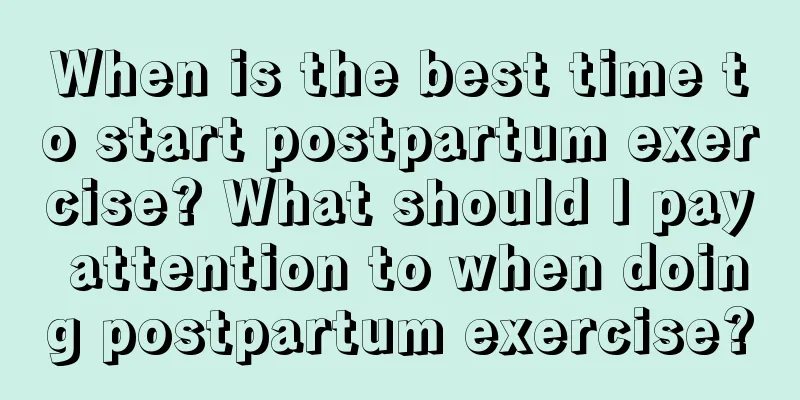Why does the baby not eat? The mother's condition is very important

|
Many children become unwilling to eat after they are able to eat complementary foods. They seem to be not interested in anything other than milk, and they don’t eat rice. So what is the reason for the baby’s unwillingness to eat? Is there any way to change this situation? Why doesn't the baby eat?1. The baby has irregular eating habits, no fixed eating time, prolonged or shortened eating time, and the normal gastrointestinal digestion rules are disrupted, so the child will not eat obediently; 2. One-sided pursuit of high nutrition, giving children meat, eggs and milk without restraint, which damages the gastrointestinal tract and causes indigestion; 3. Constant snacking, constant mouthfeeling and a restless stomach can lead to gastrointestinal motility and secretion disorders; 4. High-calorie drinks, ice cream, chocolate, etc. keep blood sugar at a high level without feeling hungry; 5. Poor eating environment, playing while eating, or parents teasing or scolding while eating, so that the food center of the cerebral cortex cannot form a dominant excitement focus; 6. Parents pay too much attention to their baby's eating, which makes the baby rebellious and then uses refusal to eat as a bargaining chip to make conditions; 7. The baby does not exercise enough, metabolism is reduced, and the gastrointestinal digestive function cannot be strengthened; The mother's condition is important.For babies over 6 months old, when adding complementary food, they should be able to sit with support and use their upper lips to "clean the food in the spoon" instead of just sucking the semi-solid food in the spoon. The correct way to feed complementary food is to use a bowl and a spoon to feed, and do not mix rice flour in milk and feed with a bottle. Let the baby learn the chewing action. In addition, when feeding the baby, the mother's state is very important. You must eat with the baby and let the baby watch the mother chewing. The demonstration of the "chewing" action is very important, even if you are chewing gum. What you must not do is to chat, be distracted, watch TV or do other irrelevant things while feeding the baby. That will soon develop into a very strenuous feeding. Eat with the baby, or you eat first and show the baby, he will be very willing to imitate your actions. Many of our mothers do not eat themselves, but feed the baby first, so such babies will easily not like to eat. What to do if your child doesn't eatCultivate your child's sense of hunger. If your child stops eating after a few bites, do not force him to continue eating. Instead, say to your child, "Baby, you are full," and then take away all the food. When your child says he is hungry, give him the food. Do not watch your child eat from a close distance. Pretend you have not seen him and observe from a distance. At this time, the child will eat by himself because he is hungry. These problems will also affect the baby's appetite1. The baby is unwell If the baby vomits, is constipated or has diarrhea, parents should immediately take the baby to a doctor for treatment. Experts also say that in hot weather, babies sometimes eat more or less due to their mood or environmental factors. Parents don't need to worry too much and don't have to feed a fixed amount of food at a meal to be satisfied. If the baby's growth curve is within a reasonable range, he is in good spirits, and has no uncomfortable symptoms such as bloating, constipation, diarrhea, etc., the best way is not to force him to eat! 2. Hot and muggy weather When the weather is hot, the mother's main job is to lower the room temperature. It is easier to eat in an air-conditioned room than to coax him to eat in other rooms. 3. The atmosphere during meals Babies are very sensitive. If the atmosphere at home is bad or they are scolded, it will also affect their emotional response. Experts suggest that when babies reach one year old, they can also learn to eat by themselves. If food is spilled all over the floor, do not rush to scold them loudly. Give them space to learn by themselves. 4. Taking medicine can also affect appetite If your baby has a fever and cold, some cold medicines may affect the baby's appetite at this time. If parents are still worried, they can ask the doctor to prescribe a better cold medicine or choose cold syrup. |
<<: What are the advantages and benefits of babies learning English
>>: Can pregnant women eat longan? Is it good for pregnant women to eat longan?
Recommend
What are the symptoms of uterine cold? How to treat uterine cold?
The uterus is the palace of the child. A cold ute...
Why do children get sick easily? What should I do if my child often gets sick?
Some children often get sick and have to go to th...
How to improve your baby's learning concentration
Sometimes you need some skills to improve your ch...
How to cultivate and promote baby's understanding and memory
Watching the baby grow up every day, the mother i...
What causes baby's bow legs? What causes baby's bow legs?
Many people want to know the reason why babies ha...
Is it better to wear a nursing bra with or without an underwire? How to wash nursing bras
In order to maintain a good figure, many breastfe...
3-year-old baby development indicators 3-year-old baby development standards
The baby has grown to 3 years old. Babies at this...
Why can't milk powder be mixed and there are lumps? How to mix milk powder without lumps?
Milk powder is a necessary substance to supplemen...
What should I do if my 4-year-old baby has a fever of 39 degrees? How can I reduce the temperature of my 4-year-old baby?
The last thing a mother wants to encounter is a b...
Can babies take probiotics for a long time? Can babies take probiotics for a long time?
Probiotics have become a common health product. M...
How many days after ovulation can pregnancy be detected?
Having a healthy baby is the wish of every couple...
Why are the baby's leg lines asymmetrical? What are the growth and development standards for infants and young children?
Sometimes, carefully observing the baby's leg...
Which country's brand does Pampers diapers come from? How long is the shelf life of Pampers diapers?
Pampers diapers are an old brand and have always ...
How to determine the jaundice status of newborns? How to make babies like to drink water?
Many first-time parents don’t know what to do whe...
Can I lose weight by breastfeeding? Can I lose weight by breastfeeding?
Will breastfeeding make you thinner? Today, I wil...









